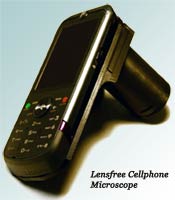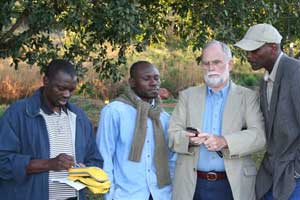Fogarty grants $4 million for multidisciplinary teams
October 2010 | Volume 9, Issue 5
Twelve U.S. universities and their partner institutions are dividing about $4 million for one year of support to form innovative, multidisciplinary global health research teams. Called Framework Signature Innovations awards, they are part of the final distribution of Fogarty’s Recovery Act funds.
Researchers from schools of business, architecture and social work will join with colleagues from the more expected sources of global health postdocs, including schools of medicine, nursing, public health and public policy as well as pharmacy, dentistry and veterinary medicine, to address specific problems.

Photo courtesy of Aydogan Ozcan
Recovery Act funding will allow
the University of California, Los
Angeles to train post-docs to
develop and test tools for use in
resource-poor settings, such this
microscope attached to a
hand-held device.
"Global health innovations are urgently needed," says program officer Dr. Flora Katz. "This initiative challenged applicants to design programs that would feature problem solving, emerging technologies, new training models and new partnerships."
Two U.S. teams are working to reduce the burden of diarrheal diseases in South Africa. One group of investigators will develop a computer model of communities plagued with early childhood diarrhea using a new technology called agent-based modeling, which simulates actions and interactions of individuals to assess the effects on a system. They test hypotheses via computer simulation to identify the most promising interventions to fight infection, improve water quality and supply, and impact other environmental factors.
A second group plans to use multidisciplinary research to improve information systems, organizational behavior and decision-making processes so that policymakers will receive accurate and timely information about water and sanitation programs.

Photo courtesy of Dr. Guerrant
University of Virginia engineering professor and
Fogarty grantee Dr. Gerard Learmonth demonstrates
the use of cell phone survey technology to colleagues
in South Africa.
Technology is playing an increasingly greater role in global health research, so U.S. researchers will train a new generation of scientists in telemedicine for surveillance, diagnosis and treatment of diseases in Malawi, Brazil and Mozambique. The ultimate goal is innovative, point-of-care strategies.
To reduce the spread of tuberculosis, awardees will create a virtual, multidisciplinary, multi-institutional collaborative center in which computer-assisted design and modeling will optimize the application of safe and effective ultraviolet air disinfection. This work is expected to contribute to public health efforts to limit the impact of influenza and bird flu, as well as bioterrorism agents.
Postdoctoral fellows and junior faculty from the fields of law, business, women's studies, anthropology and sociology will come together to form new domestic and international partnerships to address the causes and consequences of gender and health disparities, as well as to empower women to advocate for and achieve a high standard of healthcare.
Framework Signature Innovations awards are supported by Recovery Act funds from Fogarty, the NIH Office of the Director and the National Institute of Nursing Research.
More Information
To view Adobe PDF files,
download current, free accessible plug-ins from Adobe's website.